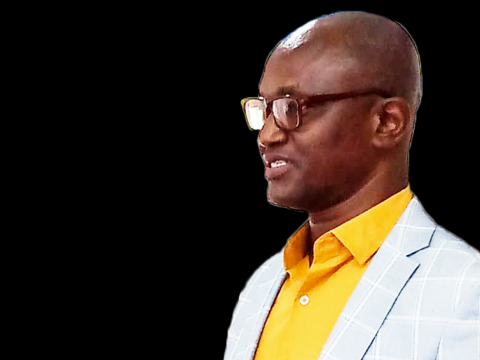By Abass Jalloh
In response to allegations of him being selective of the stories he reports to the British Broadcasting Corporation on Sierra Leone, especially political ones, the correspondent for the world’s leading broadcaster in Sierra Leone, Umaru Fofana says there is a difference between reporting for a local news outlet and a global one like the BBC.
“The BBC works under strict standards”, he said, noting that he doesn’t report based on what someone wants him to report for their self-servicing reasons.
Delivering a public lectures to hundreds of mostly Mass Communications students at FBC, Fofana said international news stories should resonate beyond the borders of a particular country, which is why not all stories are carried on the BBC. He said correspondents pitch story ideas which do not always get commissioned.
Making reference to the protest against him by a handful of Sierra Leoneans in front of the BBC headquarters in London he said: “The protest at the BBC was probably a good thing to the extent that my bosses felt that I was under threat in Sierra Leone”. He said people were free to protest but when such is based on hate and without basis, it irks.
He said he wasn’t aware of any country whose nationals had protested in London against the local BBC reporter in their country.
“But I hold it not against them because in a democracy, we expect people to protest and I think everybody must have the right to protest”, he added.
Speaking on the topic “Information as a Pubic Good”, the BBC reporter said accurate information was vital to the public to know their rights and exercise them.
Fofana said that despite the advent of social media, traditional media remained the gatekeepers in factual and ethical information dissemination.
He said that web though many in Sierra Leone, like elsewhere in the world, has turned to social media, traditional media was more accountable.
He warned that people shouldn’t believe everything they see on social media because often the authors are faceless.
Speaking on the risks involved in journalism, he said the efforts of Sierra Leonean journalists are not often appreciated by the public whom he said would hardly protest or express outrage at the arrest of or attack on a journalist.
Fofana ended his lecture by urging students and media practitioners to be more passionate, vibrant and professional in the course of doing journalism, which he described as “the greatest profession in the world”.
He encouraged them to “Do what you love and love what you do. Be creative” and warned against the taking of bribes to do or kill a story. He said the journalism students had the opportunity to become better journalists than he’d been if only they took advantage of their potential and worked harder and with integrity
Copyright © 2021 Politico Online








